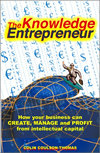 |
 |
|
 |
Achieve Commercial Success and Personal Fulfilment:
Entrepreneurship that can benefit both individuals and the
enterprise
By Professor Colin Coulson-Thomas
Would you like to run your own business or professional practice?
Are you sensitive to the entrepreneurial aspirations of your colleagues
or staff? Colin Coulson-Thomas author of ‘Individuals and Enterprise’
a handbook for achieving both commercial success and personal fulfilment
suggests that helping people to achieve their dreams might enable you
to participate in any new ventures they create. Enabling entrapreneurship
can benefit both individuals and organisations.
Employers need to recognise that many individuals consider a change of
direction. Some seek a more equitable balance between work and life, or
want more control over their destiny. Others harbour a desire to become
entrepreneurs. They become fed up being a piece on someone else’s
chess board and want to play their own game.
For reasons as varied as apprehension concerning a new role or a mid-life
crisis people question what they are doing with their lives. Sometimes
the imagined or available alternatives seem to bring their own problems
and uncertainties. People weigh the advantages and disadvantages of different
courses of action. They assess whether the risks and costs involved will
outweigh desired benefits. They wonder whether the grass will be greener
on the other side of the fence.
Certain business trends have implications for both individuals and employers.
For example, as more customers demand bespoke responses front line staff
dealing with them increasingly need to think and act like entrepreneurs.
This creates an opportunity for enlightened entrepreneurs to reconcile
personal and organisational goals.
An investigation into emerging opportunities for entrepreneurship has
examined how people and companies can best respond. The findings - along
with self-assessment exercises and checklists - are set out in ‘Individuals
and Enterprise’, a guide for intending entrepreneurs*. They reveal
the satisfaction and excitement people can derive from discovering their
inner selves, breaking free and changing course.
Giving people opportunities to be true to their ideals and beliefs can
be the key to retaining the allegiance of ambitious spirits who might
wish to start a new enterprise or make fundamental changes in their current
organisation. Challenges such as falling sales of existing products and
the threat of redundancy can be turned into exciting opportunities for
individuals to go it alone or collaborate with an existing employer to
create a new offering or launch a new venture.
Let’s look as what people who succeed financially while also being
personally fulfilled do differently. Firstly, they acknowledge that all
is not well with their existing lives. They recognise that something is
missing. They assess their current situation and decide that enough is
enough.
Life’s winners also recognise the dawn of a new era of opportunity.
They search for what is latent and tease out what is hidden. They are
alert to trends such as falling barriers. They view emerging concerns,
current problems and likely changes as potential arenas for entrepreneurship.
They consider how such developments will affect them and others, and assess
what new qualities, lifestyle options, strategies, offerings and markets
will be required to cope with them and benefit from them.
Next, our winners look at what it would take to succeed in the new arenas
of opportunity they identify. They consider changing requirements, the
limitations of current approaches and potential conflicts of interest.
They assess themselves and review their current circumstances and obligations
in relation to the essence of what will be required for an effective response.
The most fulfilled are more self-aware than others. They seek to understand
the person within and assess which opportunities - if pursued - would
most allow them to be true to their inner selves and excel. Organisations
too need to assess themselves in relation to new requirements and opportunities,
and consider the implications for ways of working and future relationships
with people whose aspirations are changing.
Smart intending entrepreneurs consider opportunities for collaboration
before they burn their boats, leave their employer and launch out on their
own. They explore options for cooperation, buy-out possibilities and the
scope of working with rather than for organisations. Confident companies
do likewise. They consider whether they should become a sponsor or business
partner rather than an employer, and encourage aspiring entrepreneurs
to become internal intrapreneurs or joint venture colleagues.
Successful entrepreneurs look at the world differently from others. They
retain a sense of wonder and excitement at the possibilities. They question,
probe and explore. They bring new combinations of elements together and
assemble winning formulae. When the time is right they seize the moment
and have a go.
Winners appreciate collective endeavour and understand the value of the
right networks and relationships. If appropriate, they collaborate with
others. They are not afraid to ask for help, but select colleagues with
care. They avoid leeches and parasites. They seek soul mates who share
their visions. They attract contributors, energetic business builders
with complementary qualities.
Rather than imitate and copy others the most fulfilled ‘do it their
way’. They recognise individuality, both in themselves and in others.
They achieve a healthy balance between reflection and action, and secure
flexible access to the capabilities they need to turn their dreams into
a reality. They avoid siren voices and the vanity of size, seeking a scale
of operation that is right for the opportunities they pursue.
Confident business leaders view the entrepreneurial aspirations of their
people as an opportunity rather than a threat. They encourage and benefit
from them. They call for proposals and back the most promising and commercial
ideas. They provide corporate support services to help intending entrepreneurs
get started. In return for a share of new ventures they offer finance,
development advice and access to a customer base.
© Colin Coulson-Thomas, 2005

Professor Colin Coulson-Thomas |
About the Author:
Prof. Colin Coulson-Thomas, an experienced company chairman, has
advised over 90 boards and management teams on director, board and
corporate development. Formerly the world’s first Professor
of Corporate Transformation and Process Vision Holder of major transformation
projects, he is the UK’s first Professor of Competitiveness
and can be contacted:
Tel: 01733 361 149
Fax: 01733 361 459
Email: colinct@tiscali.co.uk
Web: www.ntwkfirm.com/colin.coulson-thomas
*‘Individuals and Enterprise: creating entrepreneurs for the
new millennium through personal transformation’ and ‘Shaping
Things to Come, strategies for creating alternative enterprises’
- a guide for creating new offerings- can both be ordered from Blackhall
Publishing by Tel: 00 353 1 6773242, Fax: 00 353 1 6773243, email:
blackhall@eircom.net; or from: www.ntwkfirm.com/bookshop
|
|
Transforming the Company: Manage Change, Compete & Win
Colin Coulson-Thomas shows that to bridge the gap between rhetoric
and reality, business people must make far-reaching decisions about
the value to them and their companies of particular theories, past
assumptions and traditional approaches. Based on original research,
the first edition of this was ahead of its time and predicted many
of the current management trends. The author now brings the text bang
up-to-date for the 21st century. This second edition of Transforming
The Company shows how to turn theory into practice by highlighting
the obstacles and barriers that confront companies when trying to
bring about change. For management at all levels faced with this task,
this thought-provoking book will inspire and enlighten. |
| 
Buy
UK Buy
US
|
The Knowledge Entrepreneur: How Your Business Can Create,
Manage and Profit from Intellectual Capital
In many companies knowledge management has focused almost exclusively
upon the packaging of existing knowledge. This book is designed
to help readers boost revenues and profit by significantly improving
the performance of existing activities and also creating new offerings
that generate additional income. It shows how practical knowledge-based
job-support tools can transform work group productivity, and reveals
the enormous scope for addressing contemporary problems such as
"information overload" with imaginative responses. Additional
information includes: a list of possible commercial ventures; detailed
checklists that can be used for identifying and analysing opportunities
for knowledge entrepreneurship; and exercises for assessing entrepreneurial
potential and "scoping" possible products and services.
The free CD-ROM packaged with the book gives examples of particular
knowledge-based job support tools that have dramatically improved
desired results in crucial areas such as winning more business.
|

top of page |
 |
